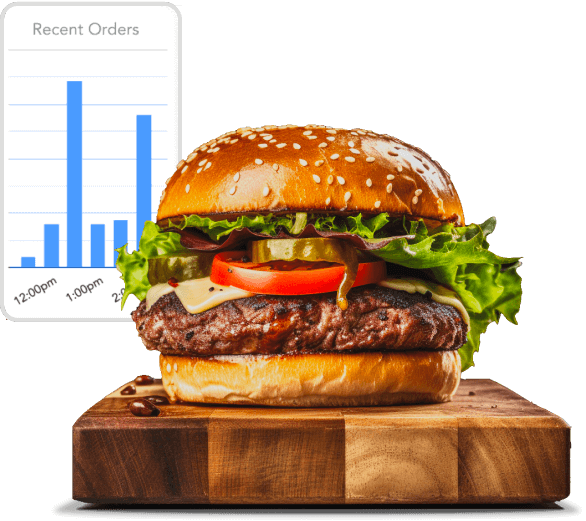10 Ways to Slash Your Bar or Restaurant's Cost of Goods
We don’t have to tell you - in the hospitality industry, every little bit counts. For a business with revenue of $2 million dollars, a reduction in the cost of goods by as little as 1% would bolster your annual operating profit by $20,000. Whatever your turnover, even the smallest percentages gains make big differences.

We don’t have to tell you - in the hospitality industry, every little bit counts. For a business with revenue of $2 million dollars, a reduction in the cost of goods by as little as 1% would bolster your annual operating profit by $20,000. Whatever your turnover, even the smallest percentages gains make big differences.
To help you pick up some of those gains yourself, we’ve pulled together 10 tried-and-true strategies to cut your cost of goods right now. Let's dive in:
1. Start Contract Pricing With Suppliers
In a competitive market, gaining an edge on pricing can significantly impact your bottom line. Rather than settling for ad-hoc pricing, set up a tender process. This involves providing potential suppliers with a list of items and expected purchase volume over a specified period, and then asking for a set price for each item. This process encourages competition among suppliers and ensures you secure the best prices.
(If you’re using Loaded, the tender module under Stock > Ordering > Supplier Tenders is a handy tool that makes this whole process a breeze.)
2. Track Prices Accurately
While negotiating good prices with suppliers is important, it’s equally crucial to ensure that you're charged correctly. Keep track of your purchases to ensure they match the prices your suppliers actually charge you. This allows you to maintain an accurate and up-to-date account of your expenses and spot any discrepancies with your agreed contract prices, helping you sort out overcharging issues promptly.
(In Loaded, your purchases and supplier charges are all in the same place, making this easy.)
3. Streamline Inventory Management
Efficient inventory management is the backbone of any hospitality business. Make it a part of your team's routine - as crucial as cleaning tables or serving customers. Ensuring that orders are received correctly every shift - including goods being put away promptly and in their correct storage areas - reduces the chance of over-ordering and ensures that every item is always accounted for. This should be part of every end-of-shift procedure for every front-of-house and kitchen manager.
(Bonus points for receiving your orders into a system like Loaded - one, so that you know exactly how much stock you have on hand at all times, and two, so that you’ll always know your stock pricing is up to date and thus the margins you’re expecting to achieve.)
4. Label Everything
In a busy hospitality environment, every minute counts. An easy way to save time and increase efficiency is by investing in a label machine and labeling every stock area. Not only does this reduce miscounts during stocktaking, but it also minimises the time spent on preparing orders and eliminates over-ordering due to items being hidden from view.
5. Stocktake Regularly
Regular stocktaking doesn’t have to be just a tedious chore (we promise!). Done right, it’s an invaluable opportunity to gain insight into the actual cost of your goods versus your expectations. We recommend weekly stocktakes on all beverage items and high moving kitchen items. If this seems overwhelming, start small. Prioritise the counting of your biggest selling items, as these are typically where the most wastage occurs.
(The stocktake templates in the Loaded stocktaking module will really streamline this process.)
6. Communicate More
Communication is the lifeblood of an efficient operation. Make a habit of informing staff about potential wastage issues. Highlight the top five items for the team to focus on reducing wastage in - this could range from ensuring beer is poured to exact measurements, to cutting a tomato exactly as per the recipe for a high selling burger. A staff Facebook group or regular team meetings are great ways to facilitate this communication.
(One of our hospo friends produces a Loaded report at the end of each stocktake, highlighting the five items they need their staff to concentrate on getting right.)
7. Set A 'No Partial Boxes' Policy
Implement a rule where staff must break down boxes completely when taking stock. This practice ensures that no items are ever left unnoticed or uncounted. Partial boxes often lead to inaccuracies during stocktakes that then turn into misplaced orders. Having a designated shelf for full boxes and a separate one for individual items can streamline this process.
8. Track Returns With Credit Notes
Returns are an inevitable part of the hospitality business. Because of that, it's crucial to ensure that you receive the correct credits from suppliers when items are returned. Create a credit note (in Loaded's ordering section, if you’re using us, so it’s all in one place) as soon as an item is returned. This keeps your admin team informed and helps them track credits from suppliers efficiently.
(Loaded pro-tip: Enter your kegs and kitchen crates as stock items, so that you can track keg and crate deposits within Loaded).
9. Print Every Purchase Order
It might seem old-fashioned to print purchase orders, but this simple step can reduce confusion and improve efficiency. Print out your order (easily done from Loaded, which has that option built in) and place it on an 'outstanding orders' clipboard. This ensures that whoever is on duty today knows exactly what should be arriving from suppliers, even if the team is different from the day the order was made. This simple habit hugely reduces the chances of error or miscommunication.
(The great thing about having a printed purchase order - and then making sure this matches exactly to the digital version you receive in a system like Loaded - is that you can then send your purchase orders directly to Xero as draft invoices. The time savings here are huge.)
10. Implement A 'No Purchase Order, No Payment' Policy
Reinforce efficient ordering habits by implementing a policy where suppliers can only fulfill an order if they receive a purchase order. This policy encourages your team to order correctly, ensuring all orders are tracked and reducing the possibility of delivery errors.
(And if they run those orders through Loaded, everything is in the one hub, neat and ready to be matched when the orders are received.)
Implementing these strategies won't just save you pennies - they'll result in substantial financial savings. On average, businesses using Loaded have seen a 2-3% reduction in their cost of goods (a considerable margin in the hospitality industry!). But the benefits don't stop there. A streamlined, efficient operation not only reduces costs but also fosters a better working environment and improves service quality.
Remember, these improvements don't have to happen all at once. Start by identifying which of these strategies will have the biggest impact on your business and focus on implementing those first. As they become part of your operation, explore adopting more strategies from the list.
And a final word - the Loaded team is so passionate about the hospo industry, so if you’d ever like to chat about reducing your costs or improving your efficiency please don’t hesitate to drop us a note.
We live and breathe it, and really are here to help 😀
FREQUENTLY ASKED QUESTIONS
How can a business effectively transition to a new supplier if they find more competitive pricing?
To ensure a smooth transition to a new supplier, it's best to adopt a phased approach. Begin with evaluating the new supplier's product quality and reliability in small batches. This period is crucial for assessing compatibility with your standards without fully committing. Simultaneously, maintain open communication with your current supplier to safeguard against any supply chain disruptions. This strategy allows for evaluating the new supplier's fit while keeping options open, ensuring that the transition does not negatively impact your operations or product quality.
What are the most common pitfalls or challenges businesses face when implementing these cost-saving strategies, and how can they be avoided?
When implementing cost-saving strategies, it's important to prioritise long-term value over short-term cost reductions. This means thoroughly evaluating how each cost-saving measure could impact the overall customer experience. For example, while sourcing cheaper ingredients might reduce immediate costs, it could lead to a noticeable decline in product quality that customers will feel. Conduct a comprehensive analysis to understand the implications of cost reductions on your service or product quality, ensuring that any savings do not compromise the core value proposition you offer your customers.
How does a business balance cost-cutting measures with maintaining or improving quality for the customer?
Balancing cost-cutting measures with maintaining or improving quality involves focusing on efficiency and waste reduction while investing in areas that directly affect customer satisfaction, such as high-quality ingredients and exceptional service. This approach ensures that cost savings are achieved without sacrificing the quality of the product or service offered. You should leverage technology and data analytics , too - the best platforms will help you identify inefficiencies and optimise your operations. Regular training for staff on cost-control measures and the importance of quality can also reinforce this balance. You can also engage customers for feedback on changes that can guide improvements and adjustments, ensuring that cost savings don't detract from the customer's experience, but rather, contribute to a sustainable business model that prioritises excellence and value.

More Profit
Making money doesn’t happen by accident! Learn how to tune your business and improve your bottom-line.

More Success Stories
Get inspired by stories from real Loaded customers who run thriving hospitality businesses.

More Labour
Get tips for optimising your staff’s time, and for managing your team effectively.

More Culture
Making money doesn’t happen by accident! Learn how to tune your business and improve your bottom-line.

More Design
Making money doesn’t happen by accident! Learn how to tune your business and improve your bottom-line.

More Design
Making money doesn’t happen by accident! Learn how to tune your business and improve your bottom-line.

More Design
Making money doesn’t happen by accident! Learn how to tune your business and improve your bottom-line.
Learn from the best
Find articles, videos, E-books and more all delivered by our qualified, world-class community of expert hospitality operators: take a look
Season 2: Spring Bootcamp for a Money-Making Summer
We've poured our 100+ combined years of hospitality experience into a series of live and recorded webinars that will be your bootcamp for a money-making summer.
































